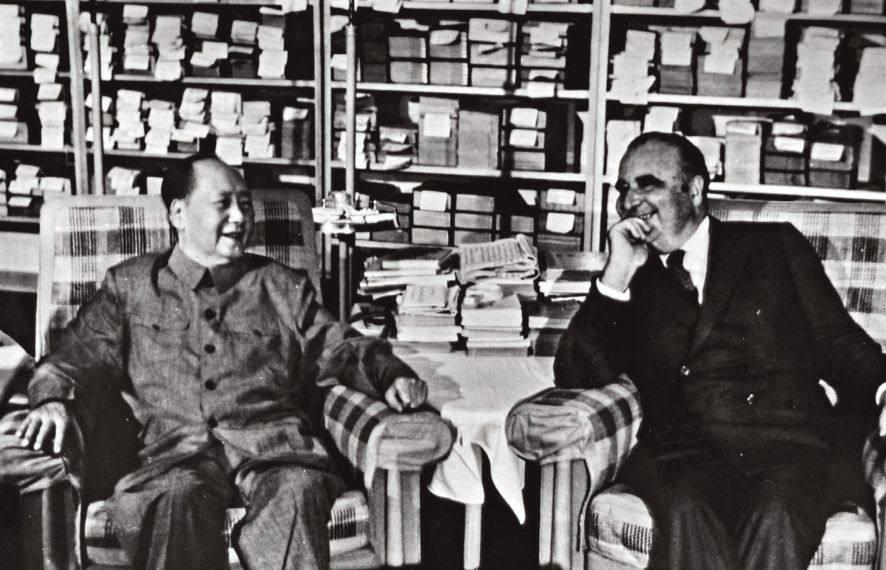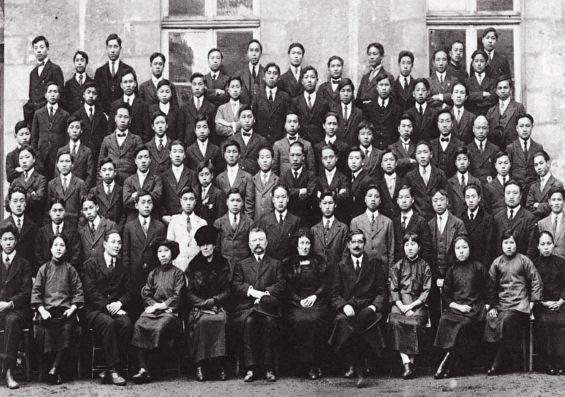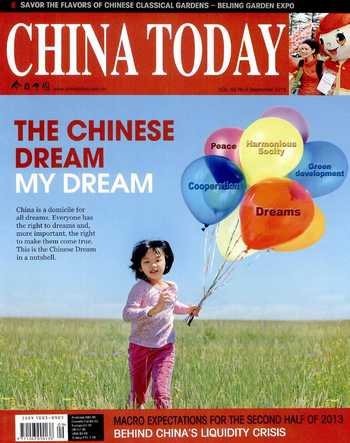The Chinese Dream and the French Dream Are Interlinked
By CAI FANGBAI
THE Chinese Dream is closely linked to the dreams of other nations. Realizing the Chinese Dream will therefore benefit other countries, including France, and so contribute to world peace and prosperity.
Dream of Cooperation and Win-win
National prosperity and rejuvenation, and peoples well-being constitute the core of the Chinese Dream. This is the ideal that millions of Chinese have struggled for in the modern era. Since 1949, when the Peoples Republic of China was founded, and especially over the past 30 years since China adopted the reform and opening-up policy, China has made great achievements and become the worlds second largest economy. We have never been as close to our goal as we are today. China, however, also faces unprecedented challenges due to various complicated factors both at home and abroad. To realize the Chinese Dream – doubling Chinas 2010 GDP and per capita urban and rural income by 2020 and completing construction of a comprehensive well-off society, and becoming a democratic, civilized and harmonious modern country by the mid-21st century – China must insist on a path of peaceful development, on comprehensively deepening reform and openingup, and on common benefits and an open strategy as it works towards constructing a world of perpetual peace, common prosperity and harmony.
The Chinese Dream is about peace, development, cooperation and win-win. It therefore links up with the dreams of other nations. Against the backdrop of multi-polarization, economic globalization, cultural diversity and an information society, methods of international cooperation will expand on multifold levels. Countries are increasingly economically interdependent. The development of China is thus inseparable from that of the world and vice versa. Globalization is now the prominent issue. No country is able to deal alone with existent risks and challenges. Only cooperation and win-win can safeguard the interests of each party, world peace and com-mon development. Changes in the international status quo, especially since the global financial crisis, show that solidarity and cooperation are the only way of coping with major international crises and challenges.
French Elements in the Chinese Dream
The greatness of the French nation lies in that it has produced numerous thinkers, philosophers, writers and scientists that have enriched world civilization. The French Revolution in 1789 overthrew feudalism, and the popular uprising in 1871 established the Paris Commune — the worlds first proletarian regime. These events transcend in importance nationality or time in advancing the world. In the early 20th century, many Chinese students went to France to work and study. They all cherished the common dream of finding a way to save their motherland from colonialists and realize rejuvenation. Many later formed the backbone of Chinese revolution and socialist construction, or became leading figures in culture and arts. Their most outstanding representatives were Zhou Enlai, first premier of the PRC, and Deng Xiaoping, chief architect of Chinas reform and opening-up.
France had special significance in Zhou Enlais life. Upon arrival in Paris in December 1920 he embarked on a four-year course of study. It entailed detailed research on France, other European countries and investigations of various theories, all of which formed the basis of his eventual ideals and convictions. In one year he wrote articles adding up to 200,000 characters, introducing political and social situations of France and other European countries to the Chinese people. As the first premier of the PRC, Zhou closely monitored development of the China-France relationship, to which he made significant contributions at each critical juncture. Perhaps most notable was that in 1964, when China and France discussed establishing diplomatic relations. After six rounds of negotiation with Edgar-J ean Faure, French former Prime Minister and representative of General Charles de Gaulle, Zhou raised three tacit understandings. Zhous strategic vision and pragmatic spirit as a statesman and diplomat enabled him to break the deadlock and bring negotiations to a successful conclusion. The tacit understandings laid a solid foundation for development of the bilateral relationship.
Deng Xiaopings efforts were also instrumental in nurturing the China-France relationship. Deng arrived in France in October 1920. After five months at the Bayeux Middle School in Normandy, financial problems forced him to abandon his studies and earn his keep. He found work at Schneider & Company, Renault and other factories. At the same time he participated in revolutionary activities led by Zhou Enlai, joining the European branch of the Chinese Communist Youth League in 1922 and the Communist Party of China in 1924. When he left for Moscow in 1925, the French police presented him with an expulsion order at the railway station prohibiting him from ever returning to France. Half a century later, however, in 1975, Deng returned to France at the invitation of then Prime Minister J acques Chirac to a courteous reception. He held three official discussions with Prime Minister Chirac and President Giscard DEstaing, reaching broad consensus on bilateral relations and on major international issues. Both parties also agreed to establish the ministerial level negotiation mechanism. France was the first Western country to set up this mechanism with China, which constituted a breakthrough for bilateral relations. In other words, Dengs visit to France had great influence on bilateral development as well as on Chinas reform and opening-up.

T he Chinese and French Dreams Are Interlinked
General de Gaulle used to say that France cannot be France without greatness. The dream of the French nation was to enact the role of big country – one identical with the Chinese dream of national rejuvenation. In the past half-century since the setting up of diplomatic relations, therefore, the two countries have created three “firsts” – France was the first big Western country to establish diplomatic relations with PRC; the first to establish a comprehensive partnership with China; and the first to establish a comprehensive strategic partnership with China. These “firsts” fully convey the importance and particularity of the bilateral relations. President Xi J inping recently pointed out that, under the new situation, China and France should continue to give priority to the strategic partnership and support one another, to deepen cooperation, and realize a win-win situation despite variances in their respective political systems and cultural traditions.
To realize the Chinese Dream, China should expand opening-up and increase exchanges and cooperation with foreign countries. In the next five years, China expects to import goods worth more than US $10 trillion and invest US $500 billion in foreign countries. Meanwhile around 400 million Chinese people will travel abroad. This will provide China with huge space for international cooperation and win-win; it will also generate more business, job opportunities and economic growth for other countries, including France.
The world economy is currently amid a slow recovery. France is dealing with difficulties with the aim of increasing competitiveness and stimulating economy. China is accelerating the transformation of the pattern of economic development and optimizing its economic structure. Both countries should enhance cooperation and mutual benefit, oppose trade protectionism and so realize common development. President Fran?ois Hollande visited China last April and signed over 10 cooperation documents. Other than in the traditional fields of nuclear energy and aviation, exchanges and cooperation in scientific innovation, environmental protection, urban sustainable development, modern agriculture, industrial energy conservation, and digitalization have been deepened. This will invigorate development of the China-France relationship.
In the last half-century since diplomatic relations were established, the bilateral relations, despite ups and downs, have achieved significant progress, bringing real benefits to both peoples. I firmly believe that only if both countries insist on reviewing and developing mutual beneficial cooperation on a strategic level, and on monitoring one anothers major concerns can China and France advance to a new stage over the next 50 years where each realizes the dream of benefiting their peoples and contributing to world peace and prosperity.
- CHINA TODAY的其它文章
- Sharing the Chinese Dream with Latin American Countries
- Avoid a Narrow Understanding of the Chinese Dream
- The Chinese Dream Needs Arabic Support and Cooperation
- Zeng Yi: Leading an Industry
- Rao Jin: A Dream of Becoming a Lao Teacher
- The Chinese Dream Is Conducive to the Sino-U.S. Relationship

